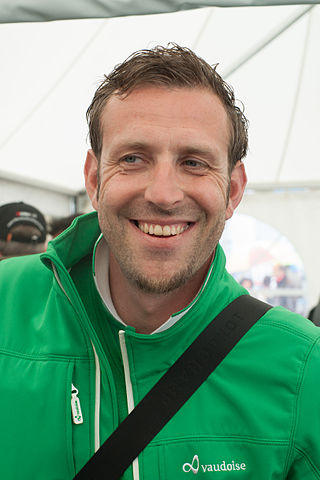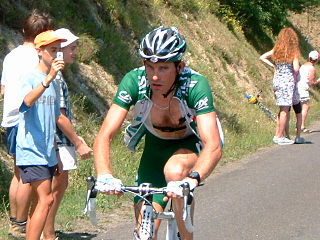
Richard Virenque is a retired French professional road racing cyclist. He was one of the most popular French riders with fans for his boyish personality and his long, lone attacks. He was a climber, best remembered for winning the King of the Mountains competition of the Tour de France a record seven times, but he is best known from the general French public as one of the central figures in a widespread doping scandal in 1998, the Festina Affair, and for repeatedly denying his involvement despite damning evidence.

Christophe Moreau is a French former professional road racing cyclist. For many years Moreau was the primary French contender for the general classification in the Tour de France: he finished in the top 12 in the GC five times and finished the race as best Frenchman in 2000, 2003, 2004 and 2005. He also enjoyed success in the Critérium du Dauphiné Libéré, winning the race overall in 2001 and 2007.
Crédit Agricole was a French professional cycling team managed by Roger Legeay. From 1998 to 2008, the team was sponsored by the French bank Crédit Agricole. Prior to 1997, the team was known as Vêtements Z–Peugeot (1987), Z–Peugeot (1988–89), Z (1990–92) and GAN (1993–98). In 1990, the team's leading cyclist, the American Greg LeMond, won the Tour de France. The team also won the team title at the Tour de France that year. Crédit Agricole announced that they would cease to sponsor the team after 2008, and the team was subsequently disbanded.

Alex Zülle is a Swiss former professional road bicycle racer. During the 1990s he was one of the most successful cyclists in the world, winning the 1996 and 1997 Vuelta a España, taking second place in the 1995 and the 1999 Tour de France. He was world time-trial champion in Lugano in 1996.

Luc Leblanc is a retired French professional road cyclist. He was World Road Champion in 1994.

Laurent Brochard is a retired professional road racing cyclist from France. In 1997 he won a stage of the Tour de France and became world road champion in San Sebastián, Spain.

Laurent Dufaux is a former professional road cyclist from 1991 to 2004. He was the Swiss National Road Race champion in 1991.

ONCE cycling team, also known as Liberty Seguros, Liberty Seguros–Würth and in succession in its final year, Astana–Würth and Astana was a Spanish cycling team. It competed in the UCI ProTour circuit.

Kelme was a professional cycling team based in Spain.

Patrice Halgand is a French former professional road racing cyclist. He was one of only three Festina team riders who were named as clean during the Festina doping scandal during the 1998 Tour de France.
The Festina affair was a series of doping scandals within the sport of professional cycling that occurred during and after the 1998 Tour de France. The affair began when a large haul of doping products was found in a support car belonging to the Festina cycling team just before the start of the race. A resulting investigation revealed systematic doping involving many teams in the Tour de France. Hotels where teams were staying were raided and searched by police, confessions were made by several retired and current riders, and team personnel were arrested or detained. Several teams withdrew completely from the race.

José Pérez Francés was a Spanish professional road racing cyclist. He finished four times on the podium of Vuelta a España and won three stages, although he never won the overall classification. He also finished third in 1963 Tour de France, after Jacques Anquetil and Federico Bahamontes, and won a stage in 1965.
PDM was a Dutch professional cycling team from 1986 until the end of 1992. Gin-MG was co-sponsor in Spanish races and Cidona was co-sponsor in the 1991 Nissan Classic. The team was sponsored by Philips Dupont Magnetics, a joint venture between the electronics company, Philips, and the chemical company, DuPont. The team rode Concorde bicycles, manufactured in Italy, by several builders that were colour coordinated to the team jersey by Ultima.

Marcel Wüst is a German former road bicycle racer. He won stages in all of the three Grand Tours; twelve stages in the Vuelta a España, one stage in the Tour de France and a stage in the Giro d'Italia.
R.A.G.T. Semences was a French professional cycling team which existed from 2000 to 2005. It was created in 2000 as Jean Delatour, and started four times in the Tour de France(2001 to 2004), with two stage wins. The team was dissolved by the end of the 2005 season.












